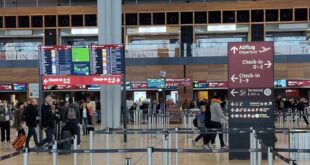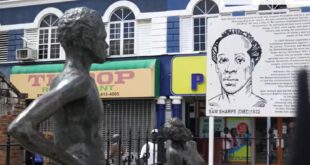When Ghana declared 2019 the Year of Return, marking the 400th year that the first slave ship arrived in America with African captives, it expected a positive response. However, the resonance of the initiative has far surpassed the country’s expectations as thousands of African-Americans, including celebrities, have made the pilgrimage to Ghana bringing various benefits to the country. Our correspondent Francis Sackitey reports from Accra
President Nana Akufo Addo’s “Year of Return” initiative, aimed at encouraging Africa-Americans to return to Ghana, has made gains far beyond expectations. “It’s more than I expected. We had hoped that it would have a big resonance but it has had a much bigger resonance than anticipated. It’s a shock alright, but it is a welcomed shock.” The President made the revelation when a delegation led by the Haitian-American journalist Roland Martin visited him at the Jubilee House in Accra.

From Beyonce’s mother, Tina Knowles, and actor Boris Kudjoe to rapper Cardi B, Ghana has been swarming with visitors. The year has seen an array of celebrities make their way into the country to explore, learn and appreciate their roots, as well as, unite with Africans on the continent.
However, many African-Americans, including Ghanaian-born ones, are coming to the country not just to visit, but to live. They are bringing a different set of skills and business tools from the American economy to the motherland, and Ghana is responding with open arms.
The campaign has raked in $1.9 billion into Ghana’s economy, according to Tourism Minister, Barbara Oteng-Gyasi.
“The climate in Ghana is ripe for entrepreneurs to fill potholes, add traffic lights and digitize tax returns, among other business moves,” Ghanaian-born business owner Kojo Terry Oppong, who moved from New Jersey, told the Washington Post.
The initiative is creating a business boom, the likes of which Ghana had not previously seen. It is not only allowing expatriates to broaden their economic horizons in America, but it’s also generating additional, much needed revenue for locals.
“Artists at the biggest craft market in town estimate their monthly earnings have risen from about $450 to $750,” according to the Post. The continued growth is creating a win-win situation for both natives and African-American expatriates, proving that in some ways, the grass really is greener on the other side.

The Chief Executive of the Ghana Tourism Authority (GTA) and Coordinator of the Year of Return, Akwesi Agyemang, disclosed in an interview at the World Tourism Market that the country was looking beyond 2019 to build on the success of the Year of Return.
“So far, we’ve seen a very strong response from the African diaspora looking to Ghana as the Pan-African leader and they have been coming to Ghana, re-engaging with the folks, tracing back their roots, and understanding what the culture of the people are. So, we are building on that into 2020 as beyond the return,” he stated.
According to him, there are key focus areas that they hope to explore as legacies of the Year of Return and beyond it. He mentioned that “the diaspora investment project that we are working on, also the birth right journeys, trying to get people to appreciate what it means when we ask them to return.
“We are also looking at real estate development, looking at investment opportunities that exist for the African Diaspora. We believe that with the global spend that the African diaspora have in tourism and travel, it’s a unique opportunity for us to tap into that spend and also to ways that we can build on tourism for development.”

He said World Tourism Market, London, offers Ghana a unique opportunity to engage with the UK market which has a lot of African diasporans.
“Here we have a very strong contingent of second and third generation Ghanaians, who will be coming back home. December is a very big month for us. We have several activities, parties, musical concerts, investment summits, and leisure and fun happening throughout the month of December, and we believe that it becomes a catalyst for us to build on for 2020 and beyond,” Agyeman maintained.
Beyond the return, Agyeman says Ghana is home. “And we mean home, we are talking about our nature, we are talking about our culture, we are talking about adventure. Ghana has several sites for adventure, we have several natural attractions, the waterfalls, the parks and all those things that make up the ecotourism product that we have, is also there for grabs.
President Akufo-Addo launched the “Year of Return” in Washington, D.C., in September 2018 for African-Americans, giving fresh impetus to efforts to unite Africans on the continent with their brothers and sisters in the diaspora.

At that event, President Akufo-Addo said, “We know of the extraordinary achievements and contributions they [Africans in the diaspora] made to the lives of the Americans, and it is important that this symbolic year, 400 years later, we commemorate their existence and their sacrifices.”
The year 2019 marked 400 years since African arrival in the United States in 1619. Ghana was a major hub for the transatlantic slave trade from the 16th to the 19th centuries. Years after the abolition of the slave trade, many African Americans have been searching for their roots in Africa. One of them is W.E B Du Bois.
In the heart of Accra, Ghana’s capital, just a few meters from the United States embassy, lie the tombs of W. E. B. Du Bois, a great African-American civil rights leader, and his wife, Shirley. The founder of the US-based National Association for the Advancement of Coloured People moved to Accra in 1961, settling in the city’s serene residential area of Labone and living there until his death in August 1963.
Du Bois’s journey to Ghana may have signalled the emergence of a profound desire among Africans in the diaspora to retrace their roots and return to the continent.
 THE AFRICAN COURIER. Reporting Africa and its Diaspora! The African Courier is an international magazine published in Germany to report on Africa and the Diaspora African experience. The first issue of the bimonthly magazine appeared on the newsstands on 15 February 1998. The African Courier is a communication forum for European-African political, economic and cultural exchanges, and a voice for Africa in Europe.
THE AFRICAN COURIER. Reporting Africa and its Diaspora! The African Courier is an international magazine published in Germany to report on Africa and the Diaspora African experience. The first issue of the bimonthly magazine appeared on the newsstands on 15 February 1998. The African Courier is a communication forum for European-African political, economic and cultural exchanges, and a voice for Africa in Europe.

































